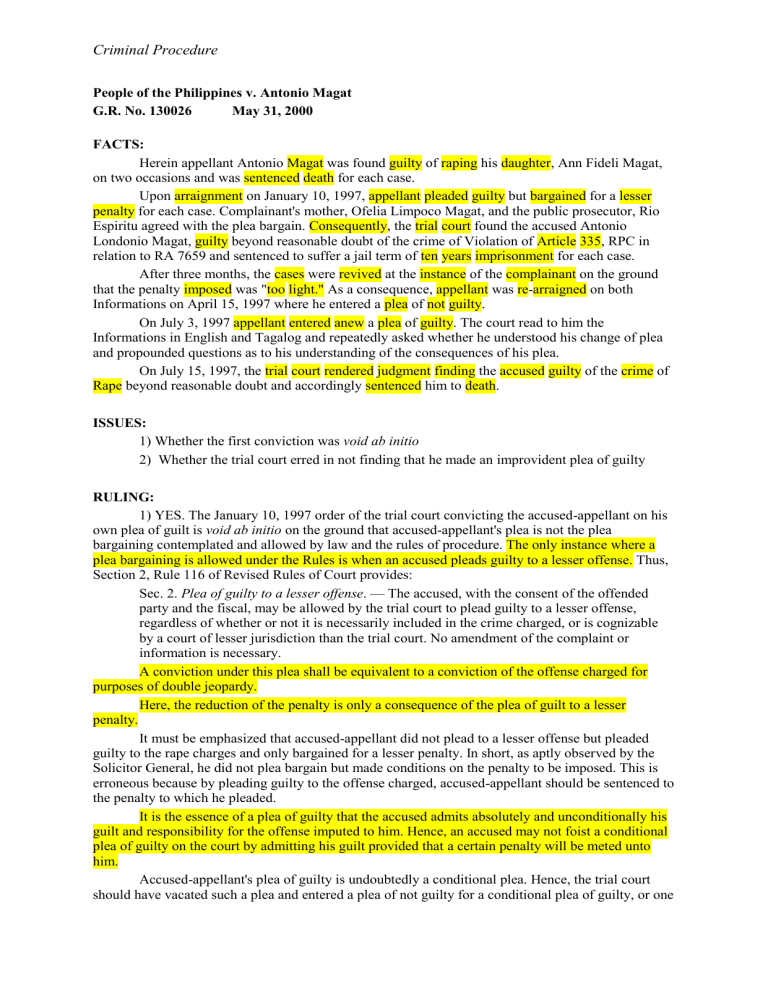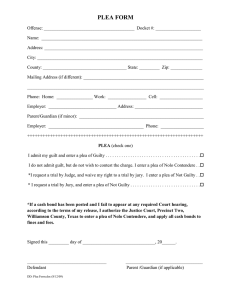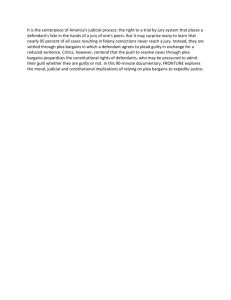
Criminal Procedure People of the Philippines v. Antonio Magat G.R. No. 130026 May 31, 2000 FACTS: Herein appellant Antonio Magat was found guilty of raping his daughter, Ann Fideli Magat, on two occasions and was sentenced death for each case. Upon arraignment on January 10, 1997, appellant pleaded guilty but bargained for a lesser penalty for each case. Complainant's mother, Ofelia Limpoco Magat, and the public prosecutor, Rio Espiritu agreed with the plea bargain. Consequently, the trial court found the accused Antonio Londonio Magat, guilty beyond reasonable doubt of the crime of Violation of Article 335, RPC in relation to RA 7659 and sentenced to suffer a jail term of ten years imprisonment for each case. After three months, the cases were revived at the instance of the complainant on the ground that the penalty imposed was "too light." As a consequence, appellant was re-arraigned on both Informations on April 15, 1997 where he entered a plea of not guilty. On July 3, 1997 appellant entered anew a plea of guilty. The court read to him the Informations in English and Tagalog and repeatedly asked whether he understood his change of plea and propounded questions as to his understanding of the consequences of his plea. On July 15, 1997, the trial court rendered judgment finding the accused guilty of the crime of Rape beyond reasonable doubt and accordingly sentenced him to death. ISSUES: 1) Whether the first conviction was void ab initio 2) Whether the trial court erred in not finding that he made an improvident plea of guilty RULING: 1) YES. The January 10, 1997 order of the trial court convicting the accused-appellant on his own plea of guilt is void ab initio on the ground that accused-appellant's plea is not the plea bargaining contemplated and allowed by law and the rules of procedure. The only instance where a plea bargaining is allowed under the Rules is when an accused pleads guilty to a lesser offense. Thus, Section 2, Rule 116 of Revised Rules of Court provides: Sec. 2. Plea of guilty to a lesser offense. — The accused, with the consent of the offended party and the fiscal, may be allowed by the trial court to plead guilty to a lesser offense, regardless of whether or not it is necessarily included in the crime charged, or is cognizable by a court of lesser jurisdiction than the trial court. No amendment of the complaint or information is necessary. A conviction under this plea shall be equivalent to a conviction of the offense charged for purposes of double jeopardy. Here, the reduction of the penalty is only a consequence of the plea of guilt to a lesser penalty. It must be emphasized that accused-appellant did not plead to a lesser offense but pleaded guilty to the rape charges and only bargained for a lesser penalty. In short, as aptly observed by the Solicitor General, he did not plea bargain but made conditions on the penalty to be imposed. This is erroneous because by pleading guilty to the offense charged, accused-appellant should be sentenced to the penalty to which he pleaded. It is the essence of a plea of guilty that the accused admits absolutely and unconditionally his guilt and responsibility for the offense imputed to him. Hence, an accused may not foist a conditional plea of guilty on the court by admitting his guilt provided that a certain penalty will be meted unto him. Accused-appellant's plea of guilty is undoubtedly a conditional plea. Hence, the trial court should have vacated such a plea and entered a plea of not guilty for a conditional plea of guilty, or one Criminal Procedure subject to the proviso that a certain penalty be imposed upon him, is equivalent to a plea of not guilty and would, therefore, require a full-blown trial before judgment may be rendered. Thus, the judgment rendered by the trial court which was based on a void plea bargaining is also void and can not be considered to have attained finality for the simple reason that a void judgment has no legality from its inception. Thus, since the judgment of conviction rendered against accused-appellant is void, double jeopardy will not lie. Nonetheless, whatever procedural infirmity in the arraignment of the accused-appellant was rectified when he was re-arraigned and entered a new plea. Accused-appellant did not question the procedural errors in the first arraignment and having failed to do so, he is deemed to have abandoned his right to question the same and waived the errors in procedure. 2) NO. If the accused pleads guilty to capital offense, trial courts are now enjoined: (a) to conduct searching inquiry into the voluntariness and full comprehension of the consequences of his plea; (b) to require the prosecution to present evidence to prove the guilt of the accused and the precise degree of his culpability; and (c) to ask the accused if he so desires to present evidence in his behalf and allow him to do so if he desires. This Court, in a long line of decisions imposed upon trial judges to comply with the procedure laid down in the rules of arraignment, particularly the rules governing a plea of guilty to a capital offense in order to preclude any room for reasonable doubt in the mind of either the trial court or of this Court, on review, as to the possibility that there might have been some misunderstanding on the part of the accused as to the nature of the charges to which he pleaded guilty and to ascertain the circumstances attendant to the commission of the crime which justify or require the exercise of a greater or lesser degree of severity in the imposition of the prescribed penalties. Apart from the circumstances that such procedure may remove any doubt that the accused fully understood the consequences of his plea is the fact that the evidence taken thereon is essential to the fulfillment by this Court of its duty of review of automatic appeals from death sentences. We have carefully reviewed the record of this case and are convinced that the trial judge has faithfully discharged his bounden duty as minister of the law to determine the voluntariness and full understanding of accused-appellants' plea of guilty. The absence of the transcript of stenographic notes of the proceedings during the arraignment do not make the procedure flawed. The minutes of the proceedings indubitably show that the judge read the Informations to the accused-appellant both in English and Tagalog, asked him questions as to his understanding of the consequences of his plea, his educational attainment and occupation. Accused-appellant could have known of the consequence of his plea having pleaded twice to the charges against him. In fact, in the two (2) letters sent to the trial court judge, accused-appellant not only admitted his "sins" but also asked for forgiveness and prayed for a chance to reform. Moreover, the prosecution has already presented its evidence. Thus, even assuming that there was an improvident plea of guilt, the evidence on record can sustain the conviction of the accusedappellant.

